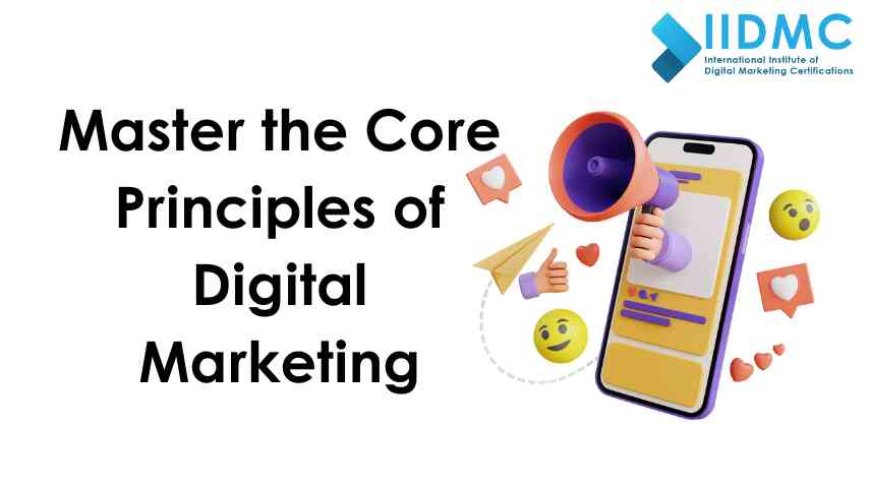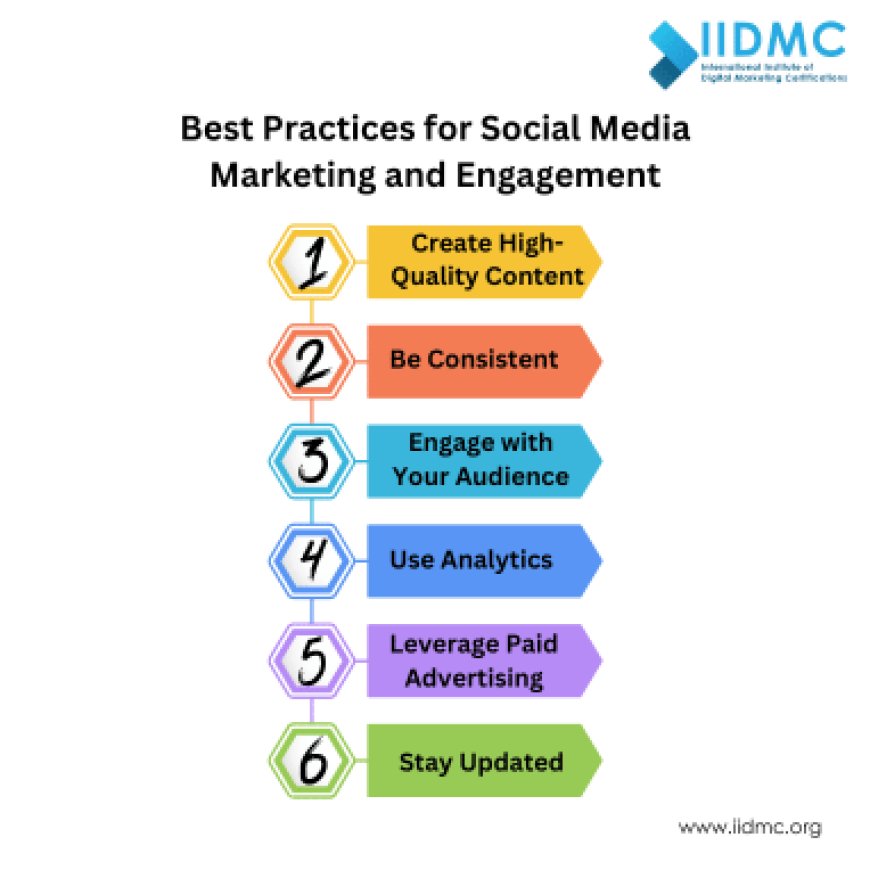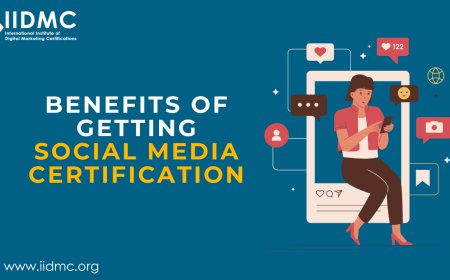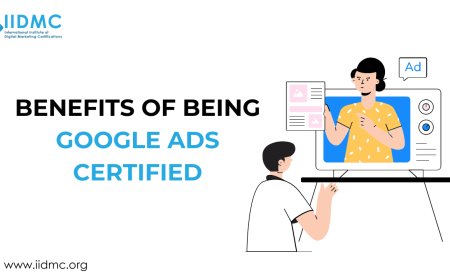Master the Core Principles of Digital Marketing
Master the core principles of digital marketing with our comprehensive guide. Learn how to effectively understand your audience, create high-quality content, leverage SEO and SEM, engage on social media, and optimize email marketing. Gain essential insights and strategies to boost your digital presence and drive results.

Mastering the core principles of digital marketing is essential for anyone looking to survive in business. Whether you're a developing entrepreneur or an established professional, understanding the fundamentals like SEO, content marketing, social media, and analytics will provide the foundation for your digital success. These principles not only help in improving traffic but also in building meaningful connections with your audience. With a solid grasp of digital marketing strategies, you'll be equipped to make database decisions that can improve brand visibility and generate permanent growth.
what is Digital Marketing
Digital marketing refers to the use of online platforms, channels, and digital technologies to promote products, services, or brands to a targeted audience. It involves a variety of tactics like search engine optimization (SEO), social media marketing, email marketing, content marketing, paid advertising, and more, aimed at engaging potential customers and improving sales. Unlike traditional marketing, digital marketing allows for precise targeting, real-time data analysis, and measurable results, making it a crucial tool for businesses in today's internet-based world.
Understanding Your Audience
Understanding your audience is the foundation of effective digital marketing. Audience research and division allow you to customize your marketing efforts to the specific needs, preferences, and behaviors of different groups within your target market. This not only improves engagement but also increases the likelihood of conversions. Segmenting your audience based on demographics, interests, and online behavior enables you to deliver personalized content that resonates with them.
Several tools and methods can help you analyze audience behavior and preferences, including Google Analytics, social media insights, and customer surveys. These tools allow you to gather data on user interactions, purchase patterns, and content preferences, providing valuable insights that shape your marketing strategies.
By adapting your content and strategies to meet the needs of your segmented audience, you ensure that your messaging is relevant and impactful. Whether it’s through tailored email campaigns, customized social media posts, or personalized website experiences, meeting your audience where they are is key to building lasting relationships and achieving digital marketing success.
Content is King
In the domain of digital marketing, content truly reigns supreme. High-quality, valuable content plays a crucial role in attracting and engaging your target audience. It serves as the foundation for building trust, establishing authority, and building meaningful interactions. Effective content not only informs and entertains but also addresses the needs and interests of your audience, making it a powerful tool for nurturing leads and converting them into loyal customers.
Content comes in various formats, each with its unique advantages. Blogs provide in-depth insights and improve organic traffic through SEO. Videos engage viewers with dynamic visuals and storytelling. Infographics simplify complex information, making it easily understandable. Other formats like podcasts, eBooks, and webinars can also be highly effective, depending on your audience’s preferences.
Consistent content creation and distribution are crucial for maintaining audience engagement and growing your online presence. Regularly publishing new content keeps your brand top-of-mind and ensures that you continuously provide value to your audience. It also helps with SEO, as search engines favor websites with fresh, relevant content. By observing a well-planned content schedule and diversifying your formats, you can enhance your digital marketing efforts and build a more loyal and engaged audience.
SEO and Search Engine Marketing (SEM)
Search Engine Optimization (SEO) and Search Engine Marketing (SEM) are essential components of a successful digital marketing strategy. SEO focuses on improving your website’s organic search rankings through on-page and off-page optimization. On-page SEO involves optimizing individual web pages with relevant keywords, meta tags, and high-quality content. Off-page SEO includes strategies like link-building and social media engagement to enhance your site’s authority and relevance.
SEM, on the other hand, involves paid search strategies, such as pay-per-click (PPC) advertising, to drive targeted traffic to your site. Paid search ads appear at the top of search engine results pages (SERPs), providing immediate visibility and improving potential customers to your website.
Together, SEO and SEM work in harmony to maximize your online visibility. While SEO builds long-term organic traffic and credibility, SEM offers quick, targeted traffic through paid ads. By integrating both approaches, you can achieve a comprehensive search engine strategy that enhances your overall digital presence, improves your rankings, and improves more qualified leads to your website.
Social Media Engagement
-
The Role of Social Media in Connecting with Audiences
-
Social media platforms provide direct channels for brands to interact with their audience.
-
They facilitate real-time communication, allowing for immediate feedback and engagement.
-
Social media helps build brand loyalty and trust through consistent, personable interactions.
-
Choosing the Right Platforms for Your Brand
-
Identify where your target audience is most active (e.g., Facebook, Instagram, LinkedIn).
-
Consider the nature of your content and which platforms support it best (e.g., visual content on Instagram, professional content on LinkedIn).
-
Evaluate platform demographics and features to align with your brand’s objectives and audience preferences.
-
Best Practices for Social Media Marketing and Engagement

-
Create High-Quality Content: Share engaging, relevant, and valuable content tailored to your audience.
-
Be Consistent: Maintain a regular posting schedule to keep your audience engaged and informed.
-
Engage with Your Audience: Respond to comments, messages, and mentions to foster relationships and build community.
-
Use Analytics: Track and analyze performance metrics to understand what works and refine your strategy.
-
Leverage Paid Advertising: Use targeted ads to reach specific audience segments and boost visibility.
-
Stay Updated: Keep up with trends and platform changes to ensure your strategies remain effective and relevant.
Email Marketing
Building and maintaining an effective email list is crucial for successful email marketing. Start by capturing leads through sign-up forms on your website and social media, and offer incentives like discounts or exclusive content to encourage subscriptions. Segment your list based on interests and behaviors to send more relevant messages, and regularly clean your list to remove inactive contacts.
When crafting email campaigns, focus on personalization by using subscribers' names and tailoring content to their preferences. Create targeted campaigns for different segments and write compelling subject lines to boost open rates. Ensure each email has a clear call-to-action, guiding recipients toward desired actions like making a purchase or signing up for an event.
To track and optimize your email marketing performance, monitor key metrics such as open rates and click-through rates. Use A/B testing to find out what elements work best, analyze subscriber feedback, and adjust your strategies accordingly. Lastly, manage your sending frequency to avoid overwhelming your audience and maintain engagement.
Analytics and Data-Driven Decisions
Tracking key performance indicators (KPIs) is crucial for seeing how well your marketing efforts are working. KPIs like website traffic and conversion rates help you understand what's effective and what needs change.
Using tools like Google Analytics and social media information makes analyzing data easier. Google Analytics gives you detailed information about your website’s visitors and their behavior, while social media insights show how your posts are performing.
Data helps you make smart decisions about your marketing strategy. By looking at your metrics, you can see what’s working and what isn’t, allowing you to adjust your approach for better results. This way, you can constantly improve your marketing and reach your goals.
Conversion Rate Optimization (CRO)
Conversion Rate Optimization (CRO) focuses on increasing the percentage of website visitors who complete a desired action, like making a purchase or signing up for a newsletter. Key techniques include optimizing landing pages, refining call-to-action (CTA) buttons, and enhancing overall user experience.
Landing page design is crucial; it should be visually appealing, relevant to the visitor’s needs, and free of distractions. Effective CTA buttons should be clear, compelling, and strategically placed to guide users toward the desired action.
Improving conversion rates involves several strategies testing different elements (like headlines and images) to see what works best, simplifying forms to reduce friction, and ensuring fast page load times to keep users engaged. By focusing on these areas, you can create a more effective website that better converts visitors into customers.
Understanding the core principles of digital marketing is key to success. We’ve discussed the importance of knowing your audience, creating great content, using SEO and SEM, engaging on social media, and effective email marketing.
It's important to keep learning and staying updated, as digital marketing changes quickly. Institutions like IIDMC can help you stay informed and skilled.
I encourage you to put these principles into practice and keep refining your strategies. By doing so, you'll improve your digital marketing efforts and achieve better results for your business.





























